How Ta-Nehisi Coates' Black Panther grapples with heroism and monarchy
As Ta-Nehisi Coates' run nears its finale, a look at it all through the lens of hero and king
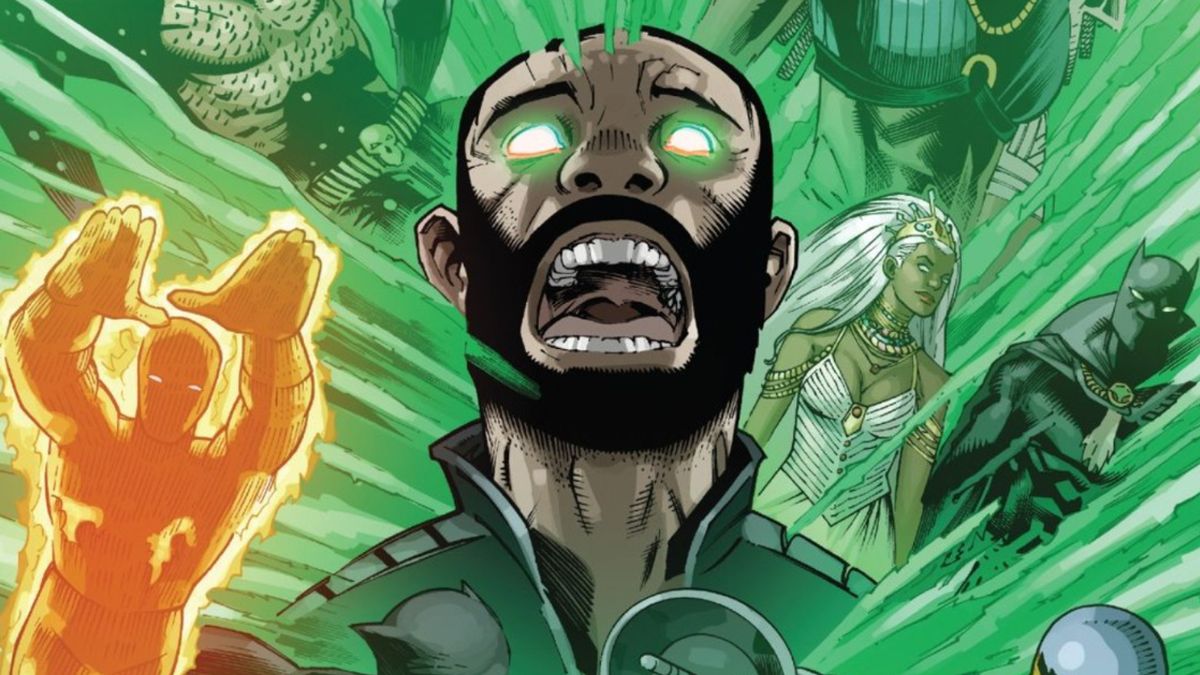
"You are a good man with a good heart. And it's hard for a good man to be king." So says John Kani's T'Chaka to the late Chadwick Boseman's T'Challa in a powerful scene in the Academy Award-winning film Black Panther. It's a statement that delivers the crux of T'Challa's character arc in the film, not one of learning how to be heroic, but how best to give life to that heroism within the context of governance.
Since T'Challa's creation by Jack Kirby and Stan Lee as Marvel's first major Black superhero, that question has always been central to the character, no matter whose authorship he was under. Whether it be Don McGregor and Billy Graham's soliloquizing adventurer in the pages of Jungle Action, Christopher Priest's tortured king wondering if the newest tactics he employed took him over the line into tyranny, Reginald Hudlin's globetrotting monarch navigating through marriage, or serving as a compromised moral compass at the end of everything in Jonathan Hickman's New Avengers, T'Challa has always had to balance his titles with his heart. So it is fitting that the character has served as a revolutionary king under the pen of Ta-Nehisi Coates in 'The Intergalactic Empire of Wakanda.'
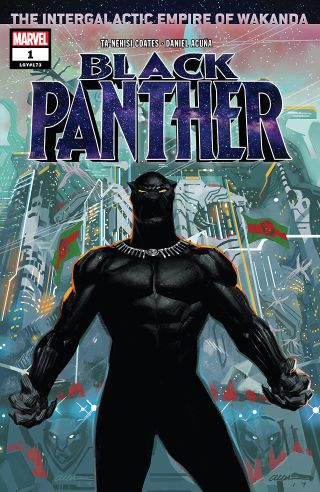
The final arc in Coates' five-year run on Black Panther, 'The Intergalactic Empire of Wakanda' sees T'Challa awaken a slave in an empire that is foreign to him. Stripped of his memories and forced into slave labor in a mine, the opening scene recalls the opening to Coates' first story arc, 'A Nation Under Our Feet.' There, the roles are reversed, as T'Challa finds himself at odds with the miners working in Wakanda's Great Mound, the source of vibranium and Wakanda's technological power.
While 'The Intergalactic Empire of Wakanda' sees T'Challa literally stripped of his identity, that loss is more metaphorical in 'A Nation Under Our Feet.' Coates' run with artist Brian Stelfreeze and color artist Laura Martin began in the wake of Jonathan Hickman's Avengers/New Avengers epic that culminated in the 2015 crossover event, Secret Wars. While T'Challa proved instrumental in saving the multiverse, both he and Wakanda suffered incredible losses in the process. Rather than shuffle that history off in favor of a new path, Coates opted to use it, telling the story of a king and a kingdom brought low.
In 'A Nation Under Our Feet,' T'Challa faces off with a Wakanda that has lost its way, the path of a nation reflecting the inner turmoil of its ruler. Wakanda has lost the title of an unconquered nation, and though it has been liberated from Thanos's Black Order, that destruction of the identity has resulted in growing resentments from the citizens towards the ruler that failed to protect them.
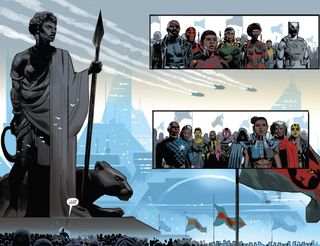
Both the Midnight Angels (led by Aneka and Ayo, two of T'Challa's staunchest allies) and the rebellion (led by the shaman Tetu) believe themselves to be justified in opposing T'Challa's rule. Tetu states his intent when he confronts his former professor, Changamire, by answering a question posed in John Locke's Second Treatise of Civil Government.
"Great robbers punish the little ones to keep them in their obedience, but the great ones are rewarded with laurels and triumphs because they are too big for the weak hands of justice in this world, and have the power in their possession, which should punish offenders. What is my remedy against the robber, that so broke into my house?"
Comic deals, prizes and latest news
Get the best comic news, insights, opinions, analysis and more!
Tetu answers the question with the blaze of insurrection, "We burn down the house – with the robber inside."
In 'The Intergalactic Empire of Wakanda,' T'Challa finds himself on the opposite end of the conflict, leading a rebellion against the titular empire that has been long separated from Wakanda's ideas of preservation and turned to conquest. In both stories, Coates ties the fate of Wakanda to T'Challa's actions. To restore peace and justice to these Wakandas, T'Challa must reclaim his nation's history. In 'A Nation Under Our Feet,' T'Challa does this by rescuing his sister, Shuri, who assumes the mantle of Aja-Adanna, having a spiritual connection to all of Wakanda's history. In 'The Intergalactic Empire of Wakanda,' T'Challa has to regain his own memories to understand how the Empire came into existence.
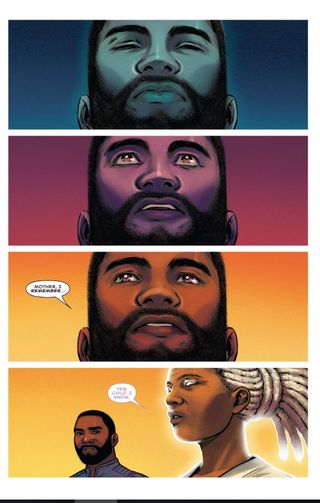
It is only after these memories are reclaimed that T'Challa can move forward. Without acknowledging and understanding his past, and the past of his nation, T'Challa cannot be the hero Wakanda needs. Once embraced, 'A Nation Under Our Feet' sees T'Challa rise as a messianic figure, a literal King of Kings, summoning the spirits of his ancestors to defend their nation alongside their "now and forever king." But after the battle is won, T'Challa questions his role as king and the part it played in the start of Tetu's rebellion. Shuri advises her brother, "The morality of kings is your morality because you are a king." And so T'Challa goes forth to set a new course for Wakanda, one that is more democratic.
This reclamation of title is echoed later in 'The Intergalactic Empire of Wakanda,' where it is only after T'Challa regains his memories that he is able to communicate across the stars with his home nation on Earth. This reconnection allows the Empire of Wakanda to reconnect with its namesake and leads to a final conflict between nation and empire.
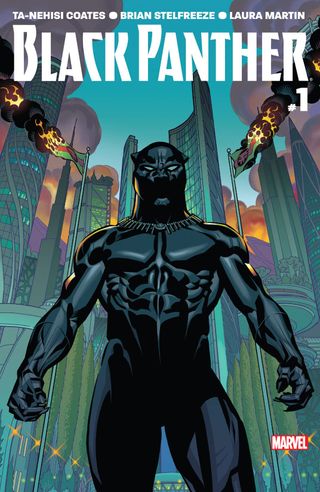
At the center is T'Challa, who must again face his ancestors in the spiritual realm of the Djalia. Illustrated by Daniel Acuña, T'Challa battles his predecessors, his failures, and his regrets. T'Challa finds himself prodded by the Djalia itself, "What shall we call one so tasked with forging order from chaos? Whose fate is ever tragedy? And what do we name one who must bear ten lifetimes of shames, rages, and fears? What shall we call him who takes up this burden lustily? What is your name?"
He answers, not out of sense of duty, or pride, but as an embrace of his true self, "King. You shall call me the King of Wakanda."
T'Challa's titles as Black Panther and King of Wakanda are essential to his character. But throughout the stories told with artists Brian Stelfreeze, Kev Walker, Daniel Acuña, Jen Bartel, and others, Ta-Nehisi Coates has also proven how essential T'Challa is to those titles. Coates has written T'Challa as an integral figure to Wakanda's history and prosperity. A man whose greatest ability is to set his nation on a course to live up to its highest ideals. A superhero.
Make sure you've read all the best Black Panther comics of all time.

Robert is a Los Angeles-based comics journalist and writer (formerly Omaha, Nebraska). He currently writes for Newsarama and Adventures in Poor Taste.
Most Popular


